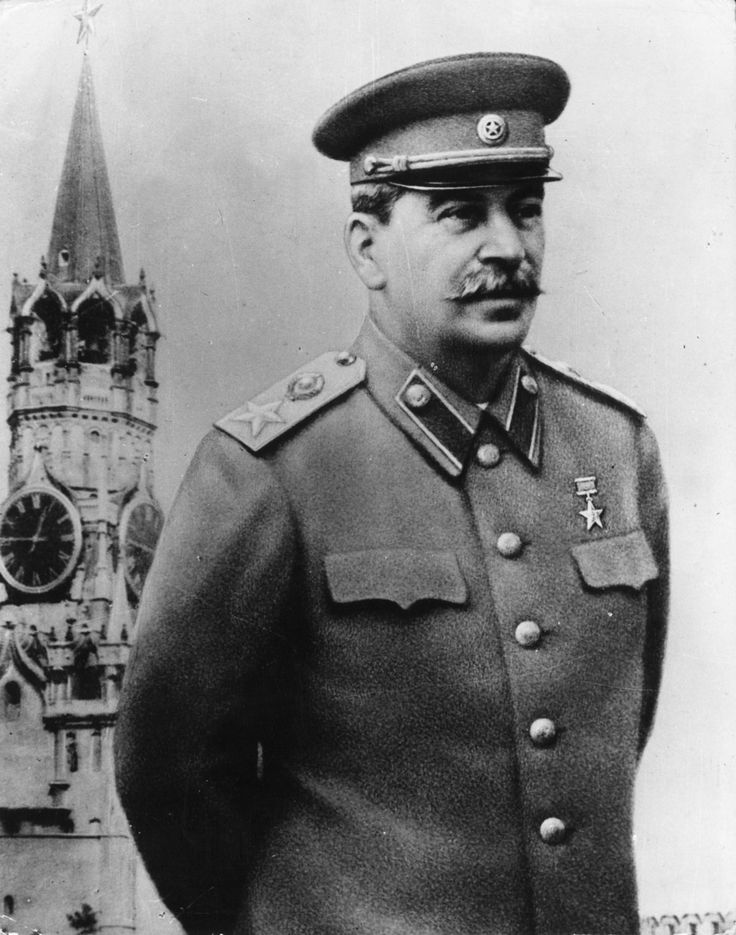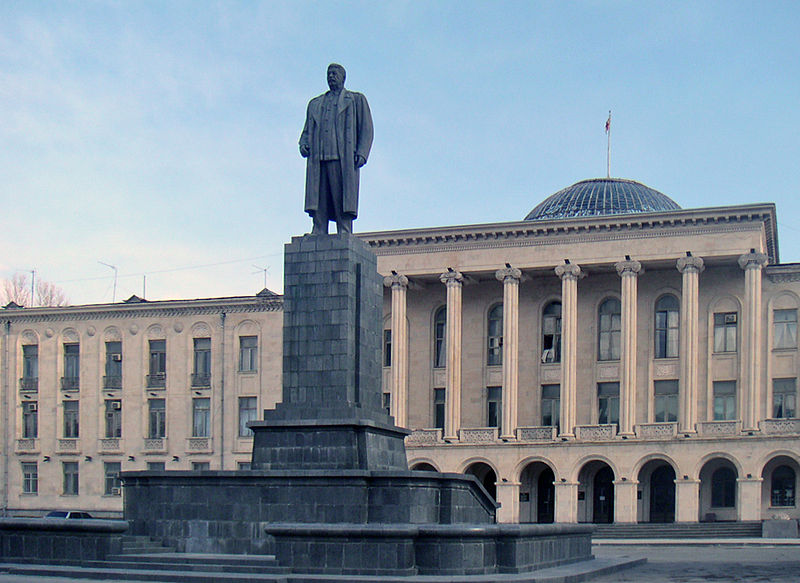 |
| Joseph Stalin |
Joseph Stalin seems to have dedicated himself to acquiring and maintaining political power in the manner of Machiavelli's prince. Unlike the prince, however, Stalin subscribed to an ideology that suggested his priorities while foreclosing certain policy options.
As the leader of the Soviet Union from 1925 until his death in 1952, he defended the achievements of the Bolshevik Revolution, pushed through an accelerated and brutal industrialization, successfully waged war against Nazi Germany, and contributed to the division of Eastern from Western Europe in the 1940s.
The man who later earned the name of "Stalin" (meaning "steel" in Russian) grew up in a Christian area of Georgia, in Russian Transcaucasia. Born Josif Vissarionovich Dzhugashvili in December 1878 to parents who both belonged to the legal estate of peasant, he had little money and few opportunities as a child. '
  |
His alcoholic father left the household during Stalin's childhood and died a vagabond in 1909. Stalin maintained a close, if not affectionate, relationship with his mother.
A good, though not brilliant, student, Joseph initially pursued his coursework diligently, and he continued to improve his Russian. He became critical of the "humiliating regime" maintained by the extremely conservative Russian Orthodox priests who ran the school, however.
Around 1895 he became involved in the social democratic discussion circles that had begun to form in Tblisi. His earlier belief in Georgian nationalism was increasingly replaced by a devotion to Marxist internationalism.
 |
| Young Joseph Stalin - 1902 |
Before he left seminary in 1899 (without completing his training), he had organized strikes and protests. In 1902 he was arrested by the czar's police for his activities. He spent the first of several terms in prison or internal exile (usually in Siberia).
He attracted the attention of Vladimir Lenin and other leading revolutionary Communists for his ruthless effectiveness as an organizer as well as for his intellectual work on nationality and nationalism. On the other hand, his methods often caused schisms and rendered him unpopular.
When the revolutionary year of 1917 began, Stalin was in Siberia. The Bolsheviks were distancing themselves from the duma, which had been created by the czar in 1905 to placate protesters but which lacked legitimacy.
The destruction of life and property during World War I fatally undermined the czar's authority, as it revealed that Russian industrial backwardness meant not only a poor standard of living for the people but also an inability to supply troops or to sustain infrastructure during war. In addition to ending the war, the Bolsheviks promised to build industry and improve agriculture through communist principles.
Stalin generally, though often cautiously, supported Lenin while the Bolshevik leader proposed a radical strategy to bring his party to power. Although important as an adjutant, Stalin did not enjoy the name recognition of Lenin, Leon Trotsky, or Lev Kamanev. Nevertheless, he joined the Central Committee and the Politburo as soon as they were created; he was also appointed people's commissar of nationalities.
During the civil war that followed Bolshevik victory, Stalin was sent by Lenin to Czaritsyn (later Stalingrad) in summer 1918 as special plenipotentiary. His assignment was to secure food from southern Russia with the assistance of a small armed detachment.
Stalin butted heads with Trotsky over the conduct of operations against the Cossacks. Before being recalled to Moscow, Stalin had carried out the executions of Red Army officers with noble blood or ties to the old czarist army. Stalin's fears—occasionally but not always entirely paranoia—of betrayal by members of the military and party were already manifest in 1921.
Historical Debate
Historians have debated whether Lenin wanted to prevent Stalin from succeeding him. Certainly Lenin was concerned about Stalin's readiness to use torture and violence instead of persuasion. In the years immediately after Lenin's death in 1924, Stalin consolidated his hold on power by discrediting rivals such as Trotsky and by emphasizing his respect for Lenin's legacy.
In fact, he immediately began to distance himself from that legacy by ordering the immediate imposition of agricultural collectivization and by elevating himself above the Communist Party. Furthermore, unlike Lenin, Stalin asserted that the Soviet Union could effect "socialism within one country" and so did not need to await socialist revolutions elsewhere.
 |
| Joseph Stalin in a vintage poster - 1942 |
Stalin's long tenure as leader of the Soviet Union was characterized by immense gains in industrial production, especially in the decade prior to World War II, often at the expense of human life and of agriculture.
He ordered citizens to build enormous steel factories and industrial towns, such as Magnetogorsk; when foreigners visited the Soviet Union, they typically expressed amazement that Stalin had achieved such results while the rest of the world struggled to cope with the Great Depression. Indeed, industrial production quadrupled between 1929 and 1938.
Meanwhile, Stalin collectivized approximately 80 percent of Soviet agricultural land and deported, exiled, or executed millions of peasants who resisted state expropriation of their land and produce. Stalin's determination to acquire foreign currency in order to support industrialization led him to authorize grain exports even in years of crop failure and dearth.
Famines occurred, especially in the "breadbasket" republic of the Ukraine. As many as 4 million people died in the Ukraine alone during the 1932–33 famine. Incompetent management and flawed policies, not a lack of grain supplies, caused the deaths from starvation.
Aside from industrialization and collectivization, Stalin also strived to reform the educational system and culture. He made it possible for generations of young people from poor and working-class backgrounds to acquire higher education and respectable jobs.
Men who benefited from Stalin's egalitarian measures included several, such as Nikita Khrushchev, who in turn became leaders of the Soviet Union. Within the sphere of culture, Stalin promoted socialist realism, an aesthetic that encouraged artists and writers to idealize peasants, workers, and everyday life under Communism while achieving a certain degree of verisimilitude.
Stalin attempted to uproot the Russian Orthodox Church from its place in Russian life, replacing it with the "religion" of Communism. However, neither Christianity nor Islam disappeared from the Soviet Union.
For much of the 1930s, Stalin prepared for imminent war against Germany. Despite the signing of the Molotov–von Ribbentrop pact between the Soviet Union and Nazi Germany, Stalin expected that war between the countries was inevitable.
Soviet armament production increased, as did fear of treason and the exile or execution of supposed traitors. During the period known as the Great Terror, in the immediate aftermath of the December 1934 assassination of Leningrad party chief and Stalin confidant Sergei Kirov, Stalin pursued all suspected terrorists and promulgated an edict that enabled an accelerated execution timetable for terrorists.
With the assistance of NKVD head Nikolai Ezhov, Stalin organized the arrest of 1.3 million political criminals, of whom almost three-quarters were executed. Approximately 90 percent of all death sentences assigned to pre–World War II convictions for political crimes were imposed in 1937 and 1938.
The Great Terror affected enormous numbers of ordinary citizens, but Communist Party elites were also imprisoned or executed in large numbers. Stalin also eliminated officers in the Red Army: 412 of 767 members of high command in 1936 were killed.
Stalin may initially have been shocked by the Nazi invasion of the Soviet Union in 1941, but he quickly recovered and marshaled his infamous strength of will. He spoke to Muscovites about the ideological meaning of the war and the Russian history of valiantly resisting invasions by seemingly superior armies. The "Great Patriotic War" cost an average of 7,050 Soviet lives each day, with a total of 8.6 million soldiers and 17 million civilians killed.
 |
| Joseph Stalin funeral |
After 1945 an aging Stalin gradually reduced his active involvement in day-to-day government. He oversaw the creation of an eastern bloc of countries sympathetic to the Soviet Union. He also prevented any war hero from gaining widespread popularity and thus from becoming an alternative ruler.
He did not appoint a successor before he died in 1952. The deStalinization campaigns of the later 1950s and early 1960s could not, however, remove the imprint left by Stalin over several decades.
In fact, opinion polls taken after the fall of communism indicated that a large percentage of Russians continued to admire him, despite the opening of archives that revealed the magnitude of the human tragedy that accompanied the triumph of industrialization.
 |
| Joseph Stalin statue |